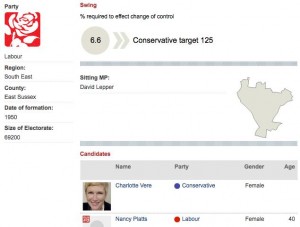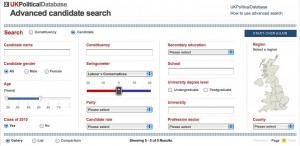I’m having a play with the Telegraph’s new political database feature, currently in beta. While launched in time for the general election, it will live on afterwards as well, as a useful tool for tracking information about political candidates and constituencies.
The basic search allows you to find information about your candidates, eg. their educational background (private / state school etc.), as well as the background stats on the constituency itself.
If your candidate is an MP, you also get a link to the Telegraph’s expenses file on them, and their parliamentary allowances page. Check out Oldham East and Saddleworth MP Phil Woolas, for example.
Like Paul Bradshaw points out on the OnlineJournalismBlog, the really nice feature is the ‘advanced search’ option.
With this, you can narrow down your search to very specific criteria – by type of school (or even name of school – eg. Eton), age or the category of candidate they are.
It is in beta though, and a lot of information is still missing. Until all the information is complete (e.g every school for each candidate is accurate and complete) you couldn’t begin to make proper analyses of social backgrounds etc.
There’s a how-to guide at this link.
The swingometer feature is fun too (though perhaps needs clearer explanation on the main page – a pop out box, perhaps?):
“[F]ind which seats will change for a given swing. Choose from Labour v Conservative swing, Labour v Liberal Democrat, or Liberal Democrat v Conservative, and push the swingometer up to 20 per cent either way to see which constituencies change hands.”
On constituency search you can see where parties have picked their battlegrounds, which can be further narrowed by retiring or defending MP. So, for example, I can search all Labour target battlegrounds, where they are defending seats. There’s a swing feature here too:
[S]earch by swing required for a change of MP from the 2005 results. This can be organised by party using the drop-down bar and slider – so it is possible to show all the seats that would fall to the Conservatives given a 10 per cent swing from Labour, for instance.
Like Paul Bradshaw says, it’s a shame that there’s no API available or ‘mashable’ data on tap, but definitely a very nice looking tool – which I need some more time to play around with.

